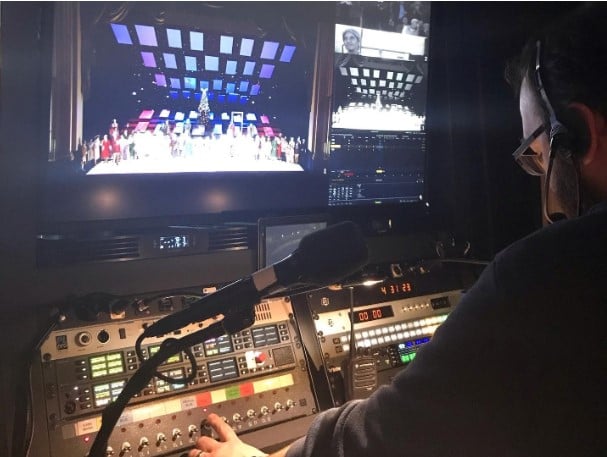Backstage with Matthew: Essential Preparation
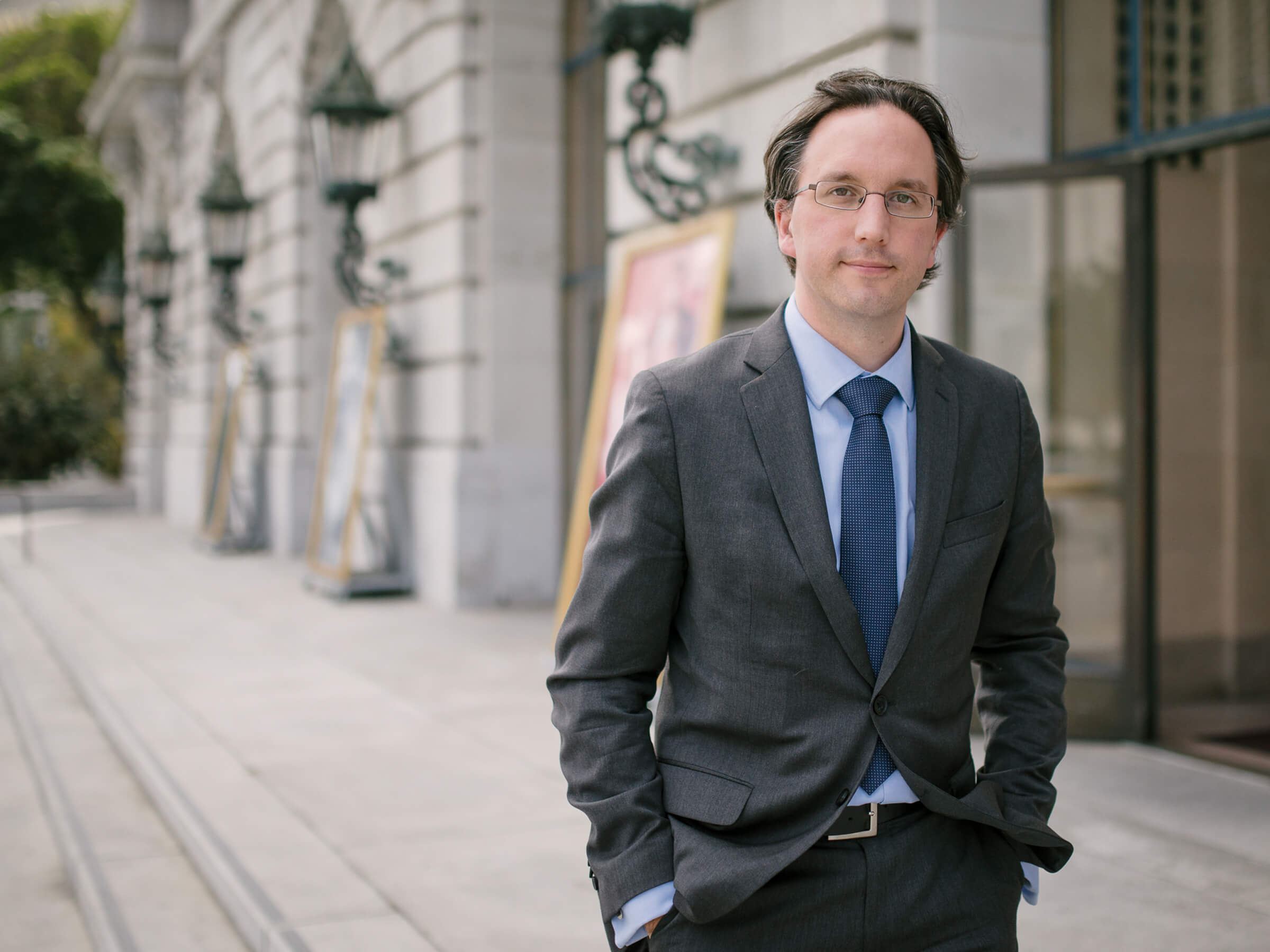
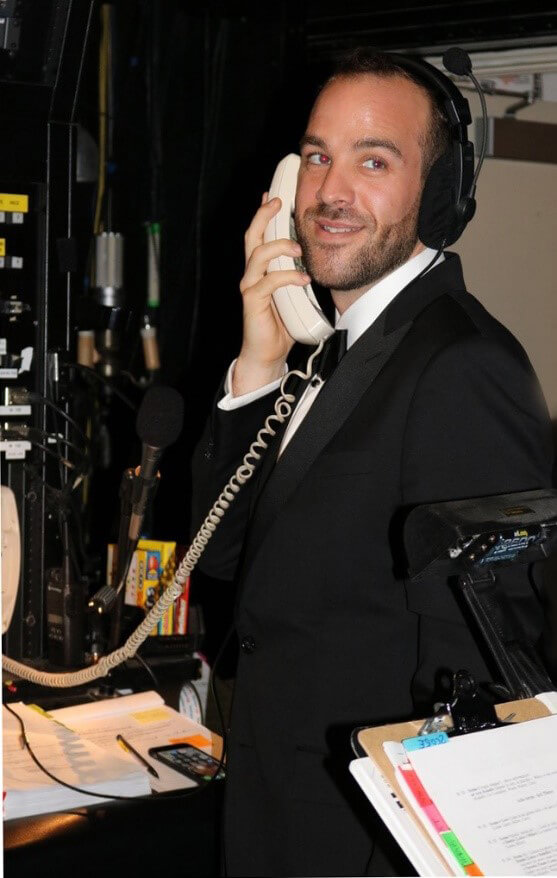
Darin Burnett at the stage manager’s console at the opening of the Opera season. Photo courtesy Valentina Simi.The staging staff arrives two weeks before rehearsals begin to begin their preparation work for each show — marking up their scores, learning the productions inside and out, developing specific rehearsal plans, etc. But there is much to be done before the whole team arrives.
With the fall season squarely behind us, the production department (which includes staging staff but also other areas such as technical, lighting, costume, and scene shop) is deep into preparing and problem solving each of the 2020 shows. These shows fall into different categories of preparation based on their origin:
- In some cases (like Fidelio and Così fan tutte), we are actively building the productions in our Burlingame scene shop. For these productions, we have ultimate control, but there are also an evolving set of questions that need to be answered, and brand-new paperwork must be created.
- In other cases (like The Handmaid’s Tale), we are keeping closely connected to what is happening in Copenhagen (our co-producer) as the production comes to life there. Because we are already invested in the production, we can have ongoing conversations with our colleague company to ensure that we fully understand all aspects of the production before it comes to us.
- We also like to have at least a couple of productions each season that we know well, in order to add some “known knowns” into the equation, and so for productions like Partenope, Bohème, and Rigoletto, it’s more a case of reviewing and updating existing paperwork, making any necessary adjustments for a new cast, and ensuring that everything is in order before rehearsals begin.
- And then there are the productions that already exist but come from elsewhere, either as rentals (like Ernani and Der Zwerg) or co-productions (like The (R)evolution of Steve Jobs). These require a particular kind of exploration and problem solving because you are often gathering and piecing together specific information from a variety of other sources — archival videos, paperwork from other companies, conversations with colleagues at other houses — and then adapting that information to fit within the specific work rules and parameters we have here to develop viable solutions.
Darin told me that he was just recently working through a question about Ernani involving a very quick costume change for the chorus between acts 3 and 4, liaising closely with our Costume Director Daniele McCartan and our costume shop supervisors. If we can discuss and solve a problem like this now, it will save precious time later in rehearsals. Even just this one question can involve many different factors: what is the right wardrobe staffing for the quick change, where can it happen safely backstage, exactly how much time is needed, how many opportunities will we have to rehearse it, how can we structure the rehearsals in order to ensure that everything is accomplished and all of the relevant break rules are followed, etc.? These are the kinds of questions that require institutional knowledge and interdepartmental communication to solve, but the investment of time upfront is invaluable. The alternative — figuring it out as you go in rehearsal — is inefficient, costly, and far too reactionary.
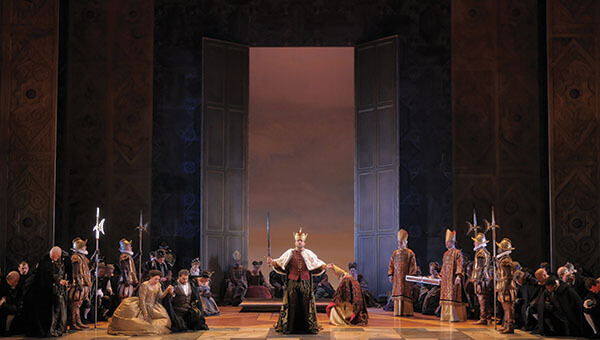
In a similar vein, the technical department is currently working through a lot of preparation for The (R)evolution of Steve Jobs scenery — an extraordinary, very high-tech projection system that we’ve not used before. A number of our crew members are training in advance on the Blacktrax projection system so that they become experts in this new technology well before it reaches the stage. This is the kind of preparation that needs to happen in advance given the pacing of work once we begin rehearsals.
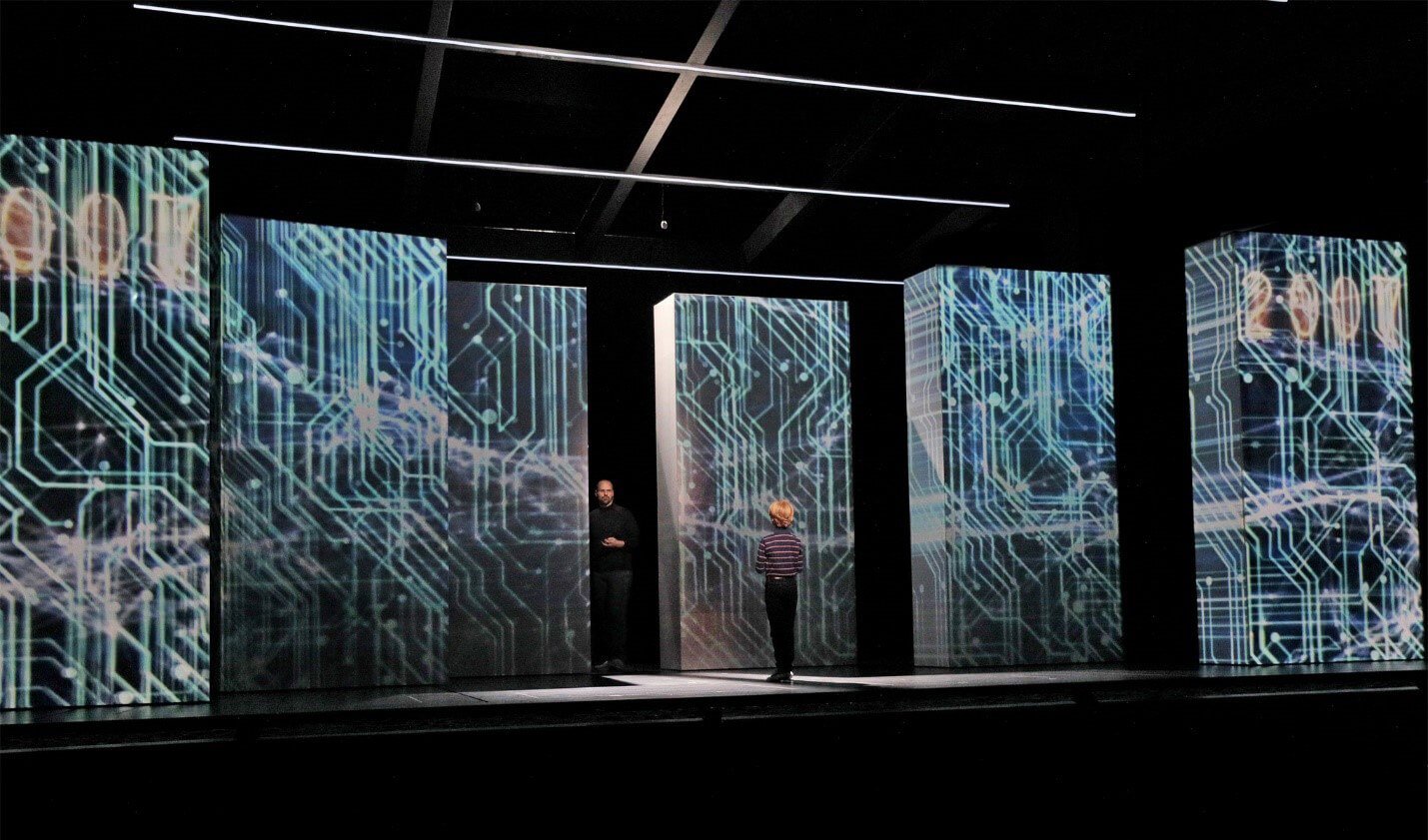
This year, Darin will stage manage Steve Jobs and The Handmaid’s Tale, which will require him to learn and study every detail and facet of those productions. But as Production Stage Manager, he must also have a strong working knowledge of all eight productions in order to pre-solve the kinds of situations as in the Ernani quick change, and to anticipate the inevitable challenges that come up once we’re in rehearsals and in the theater.
Darin will travel to Copenhagen this spring to see rehearsals for The Handmaid’s Tale. Typically, it’s very possible to amass the information for a production from paperwork and videos from the originating company but, in this case, there is such a quick turnaround from Copenhagen to San Francisco that we need to have more information before the paperwork will be ready from Europe. Seeing the actual production and how it runs onstage, as well as meeting with the creative team, will be hugely valuable as Darin prepares for it to come to San Francisco. Erik Walstad, our technical and safety director, is also spending time in Copenhagen to help ensure that the transition to our stage is as seamless as possible.
Another great example of the value of strong preparation was Rusalka last year. It was a huge show that had great demands on all the technical areas of the Company. It also had a relatively tight onstage rehearsal period, given the compact summer schedule. Because of the amount of preparation done by Darin and his team in advance, we were able to get a full act staged in just a few days, which allowed the cast some crucial early stage time. Usually, staging an act that large and complicated would take a week or more. The same kind of razor-sharp preparation will be necessary this summer for Steve Jobs when we’ll need to organize and make time for the stage crew and cast to rehearse the (almost) 50 transitions of the moving projection panels that happen throughout the opera!
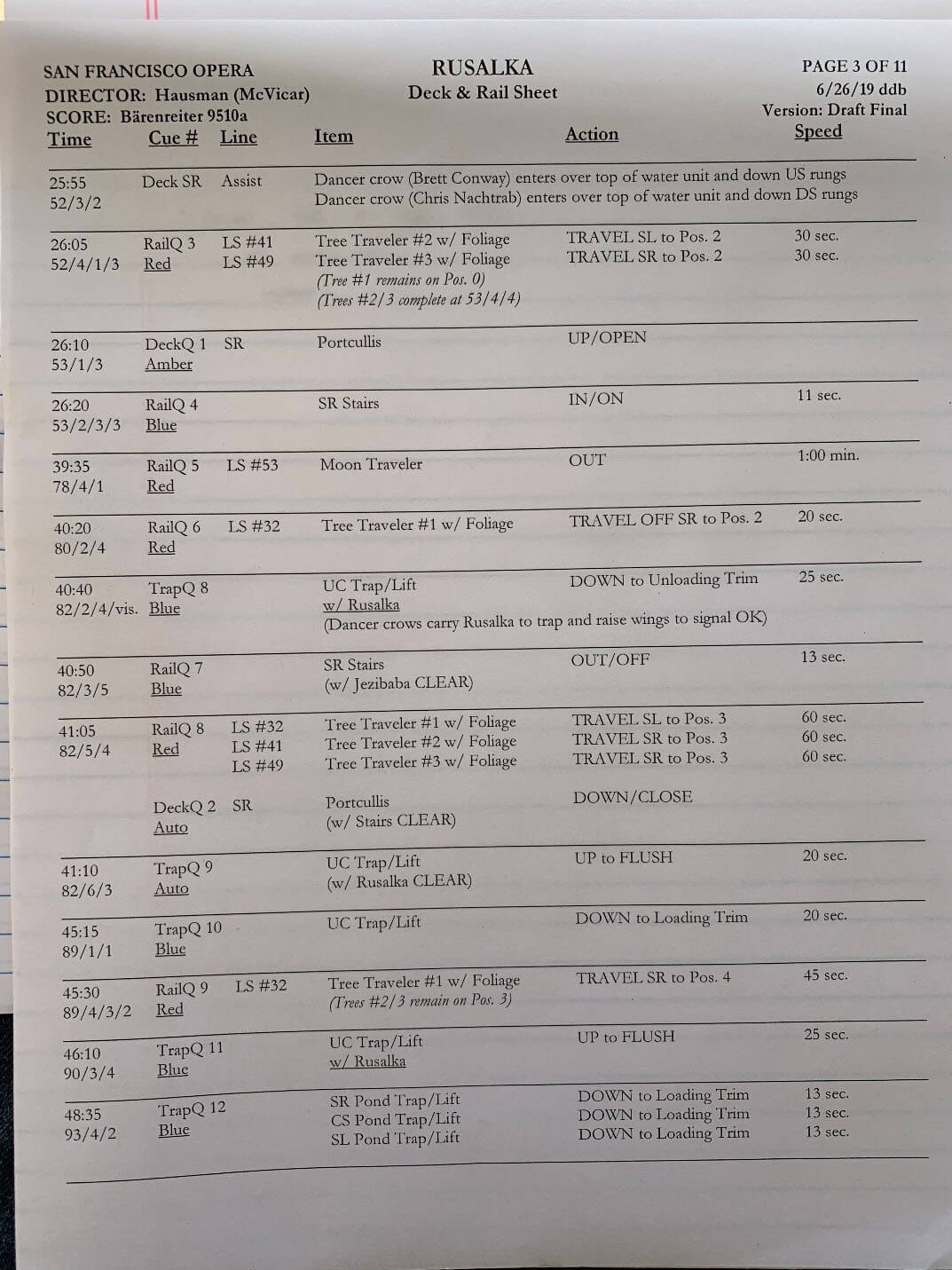
For Darin, the off-season is also a time to prepare for the arrival of his team. Each year, employment offers to the staging staff are made in the late fall, with responses due around the new year. From there, Darin makes assignments, working out the multi-layered puzzle of who will be doing what across overlapping productions. Our approach to staging staff assignments is quite unique here: many houses operate such that e.g. a stage manager only stage manages and an assistant director only assistant directs. But here, we like to offer opportunities for our staging staff to work in different roles whenever possible, which affords us a robust, highly skilled, cross-trained staff (we’ll talk more about the specific duties of the staging staff in a future Backstage with Matthew!). This kind of “deep bench” is crucial for our complex, repertory schedule.
Darin’s trajectory is a fascinating one and has perfectly positioned him for this role. He grew up doing theater in both middle and high school, where he tried to learn as much as possible about all the various aspects of technical theater. But he is also an accomplished musician, having started the piano at age 6, as well as playing clarinet, tuba, and percussion before serving in the leadership position of Drum Major of his high school band. After high school, he knew that he wanted to do something in the arts, but wasn’t sure what, or in what capacity. He attended the University of Northern Colorado and eventually earned a B.A. in Theatre Arts, but it was not until his second year that he discovered that stage management was a perfect way to fuse his leadership and organizational skills with his background in theater and music. As he says, “it’s a great way to scratch a lot of different itches!” It wasn’t until 2006 when he got a stage management internship position at Santa Fe Opera that he really encountered opera for the first time. It was there that he met Jen Good, who is now our Managing Director: Production. When she came to San Francisco Opera in 2008, she had a position available and asked Darin to come out and join our team as an assistant stage manager. So, in 2009 he began what started as a seasonal relationship with the company and, in 2015, he was offered the Production Stage Manager job. After having worked at many different opera companies across the country leading up to that, it was a great moment for Darin to finally settle down in one city and forge a long-term relationship with one company.
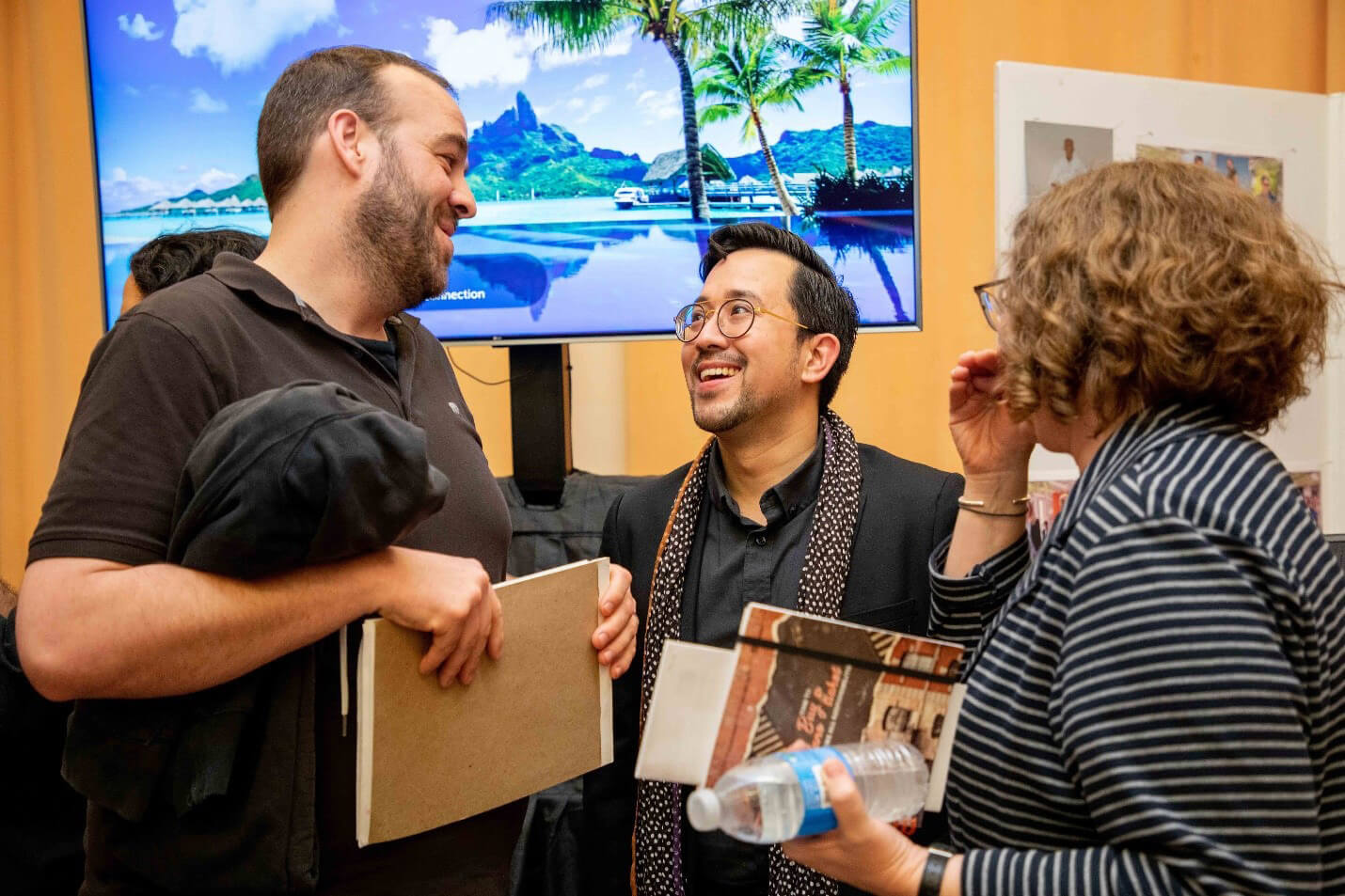
Darin’s extraordinary understanding of music and theater, his calm, even-keeled leadership skills, and his phenomenal preparation allows the Opera season to run seamlessly. It’s in these months that much of that preparation happens, delving deep into the inner workings of each production such that, once the rehearsals begin, we can use every minute of rehearsal to the very best end. We’ll be there before we know it!
